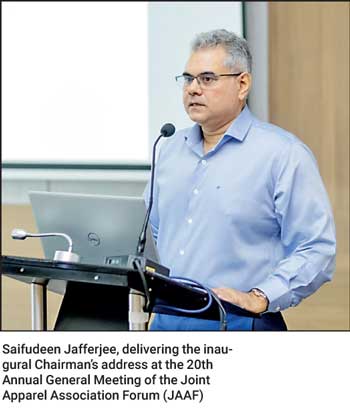Wednesday Feb 26, 2025
Wednesday Feb 26, 2025
Tuesday, 6 February 2024 00:55 - - {{hitsCtrl.values.hits}}
 Industry veteran Saifudeen Jafferjee was elected Chairman of the Joint Apparel Association Forum (JAAF), which is the apex body that guides Sri Lanka apparel towards its ultimate goal of being the world’s number one apparel sourcing destination. At the 20th Annual General Meeting held recently, the Executive Committee including Deputy Chairmen Felix Fernando and Aroon Hirdaramani were re-elected.
Industry veteran Saifudeen Jafferjee was elected Chairman of the Joint Apparel Association Forum (JAAF), which is the apex body that guides Sri Lanka apparel towards its ultimate goal of being the world’s number one apparel sourcing destination. At the 20th Annual General Meeting held recently, the Executive Committee including Deputy Chairmen Felix Fernando and Aroon Hirdaramani were re-elected.
Delivering the inaugural Chairman’s address, Jafferjee highlighted six key policy areas that the industry is seeking government support to propel the apparel sector to meet its ultimate objective of becoming the world’s number one apparel sourcing destination.
“The economic crisis has been a clear and visible indicator that the export driven model is the panacea to add fillip to Sri Lanka’s economic growth agenda. However, the macroeconomic program of the IMF has affected the business model of our industry. Therefore, it is important for JAAF to engage with the current leadership on the vital need to return to an export-led business model.” Jafferjee urged the apparel industry to expand its exports, propelling not only the industry but the country’s economy as a whole.
The adherence to cost-reflective electricity prices, as prescribed by the IMF program, has resulted in a 50% increase in Sri Lanka apparel’s operational costs, compared to competing countries. Jafferjee deemed this path unsustainable and urged the government to instigate change.
Mandatory conversions, initially introduced as a short-term measure, were questioned by Jafferjee, in light of the exchange rate appreciation and excess liquidity in the banking system. He urged the Central Bank to reconsider the policy of compulsory conversions.
The implications of VAT regulations, especially regarding food and transport services for employees, were highlighted by Jafferjee as “burdensome and illogical” calling for a prompt solution by the state. On the SVAT, he stated that empirical evidence suggests refund mechanisms do not work and advocated a more permanent arrangement.
Expressing hope for success with the ISFTA, Jafferjee emphasised the significance of market access, currently hindered by the lack of an institutional structure. “Market access is an important aspect JAAF has been working on. Despite policy intention, lack of an institutional structure has hampered the process.” The newly elected Chairman urged relevant authorities to expedite the process as market access is vital for industry growth and in turn the country’s economic revival.
Jafferjee also called on authorities to expedite the operationalisation of airport scanners to enhance the industry’s speed and capacity.
In conclusion, he expressed optimism about the promising indicators of improved orders for the industry in the second half of 2024.
The Sri Lanka Apparel Sourcing Association (SLASA) presented the conceptual framework of ‘Sourced Sri Lanka’, a roadshow planned in the UK this year bringing together buyers, brands, retailers and importers. With the collaboration of JAAF, SLASA and the EDB, the roadshow will showcase Sri Lanka’s export capabilities with the objective of increasing visibility, generating leads and sales and building key industry relations.
Deputy Chairman Aroon Hirdaramani presented ‘Sri Lanka Apparel: Ambition 2030’, a roadmap that places Sri Lanka apparel as a premier engine of export growth for the country. The presentation underscored the imperative for the apparel sector to enhance its competitiveness aligned with regional counterparts, emphasising the necessity to showcase Sri Lanka apparel’s innovation and technological capabilities and the significance of leveraging a highly skilled workforce.
Discover Kapruka, the leading online shopping platform in Sri Lanka, where you can conveniently send Gifts and Flowers to your loved ones for any event including Valentine ’s Day. Explore a wide range of popular Shopping Categories on Kapruka, including Toys, Groceries, Electronics, Birthday Cakes, Fruits, Chocolates, Flower Bouquets, Clothing, Watches, Lingerie, Gift Sets and Jewellery. Also if you’re interested in selling with Kapruka, Partner Central by Kapruka is the best solution to start with. Moreover, through Kapruka Global Shop, you can also enjoy the convenience of purchasing products from renowned platforms like Amazon and eBay and have them delivered to Sri Lanka.
Discover Kapruka, the leading online shopping platform in Sri Lanka, where you can conveniently send Gifts and Flowers to your loved ones for any event including Valentine ’s Day. Explore a wide range of popular Shopping Categories on Kapruka, including Toys, Groceries, Electronics, Birthday Cakes, Fruits, Chocolates, Flower Bouquets, Clothing, Watches, Lingerie, Gift Sets and Jewellery. Also if you’re interested in selling with Kapruka, Partner Central by Kapruka is the best solution to start with. Moreover, through Kapruka Global Shop, you can also enjoy the convenience of purchasing products from renowned platforms like Amazon and eBay and have them delivered to Sri Lanka.